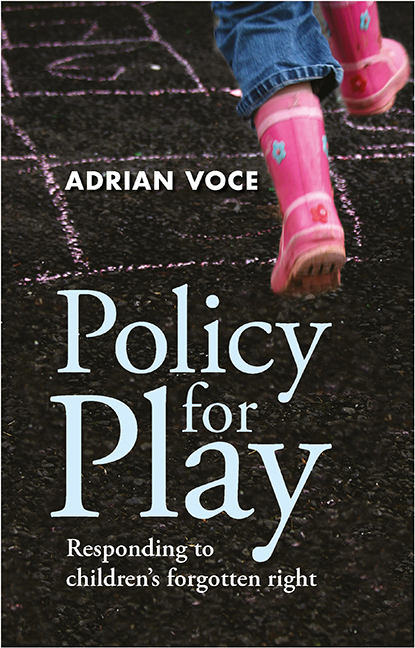Book contents
- Frontmatter
- Dedication
- Contents
- Who’s who
- About the author
- Preface
- Foreword
- Prologue
- Introduction ‘To respect, protect and fulfil’
- one ‘To play and to dream’ • Restoring play to the heart of the campaign for children’s rights
- two ‘For a change’ • Finding the evidence for play policy
- three ‘Advocates for play’ • Playwork’s place at the heart of the play movement
- four ‘New opportunities’ • Lottery funding and the beginnings of public play policy
- five ‘A vital and vibrant city’ • How devolved government in London set a benchmark for play policy
- six ‘Making the case’ • The call for a national play strategy
- seven ‘Things to do, places to go?’ • How play was overlooked by children’s services reform
- eight ‘Getting serious’ • The national play review
- nine ‘Lottery millions’ • The Children’s Play Initiative
- ten ‘Dirt is good’ • The Play England project
- eleven ‘The best place in the world’ • The Play Strategy for England
- twelve ‘Playbuilders’ • Breaking the mould of the public playground
- thirteen ‘Everyday adventures?’ • Austerity brings an end to play policy in England
- fourteen ‘Skylarks and canaries’ • The legacy of the Play Strategy
- fifteen ‘Children now’ • Responding to children’s right to play: conclusions and recommendations
- Epilogue
- References
- Index
fourteen - ‘Skylarks and canaries’ • The legacy of the Play Strategy
Published online by Cambridge University Press: 08 March 2022
- Frontmatter
- Dedication
- Contents
- Who’s who
- About the author
- Preface
- Foreword
- Prologue
- Introduction ‘To respect, protect and fulfil’
- one ‘To play and to dream’ • Restoring play to the heart of the campaign for children’s rights
- two ‘For a change’ • Finding the evidence for play policy
- three ‘Advocates for play’ • Playwork’s place at the heart of the play movement
- four ‘New opportunities’ • Lottery funding and the beginnings of public play policy
- five ‘A vital and vibrant city’ • How devolved government in London set a benchmark for play policy
- six ‘Making the case’ • The call for a national play strategy
- seven ‘Things to do, places to go?’ • How play was overlooked by children’s services reform
- eight ‘Getting serious’ • The national play review
- nine ‘Lottery millions’ • The Children’s Play Initiative
- ten ‘Dirt is good’ • The Play England project
- eleven ‘The best place in the world’ • The Play Strategy for England
- twelve ‘Playbuilders’ • Breaking the mould of the public playground
- thirteen ‘Everyday adventures?’ • Austerity brings an end to play policy in England
- fourteen ‘Skylarks and canaries’ • The legacy of the Play Strategy
- fifteen ‘Children now’ • Responding to children’s right to play: conclusions and recommendations
- Epilogue
- References
- Index
Summary
At a meeting of Play England’s strategic advisory group in 2010 – within the slender window of opportunity’ between the termination of our central government contracts to support the Play Strategy (DCSF/DCMS, 2008b) and the conclusive elimination of children’s play from government policy altogether, which would be confirmed by that autumn’s comprehensive spending review (HM Treasury, 2010b) – Ryan Shorthouse, founder of the Conservative think tank Bright Blue and a key researcher for the shadow cabinet’s child policy review three years earlier (Willetts, 2007), was addressing a somewhat shell shocked gathering.
The coalition government had made reducing government debt its ‘most urgent task’ (HM Treasury, 2010a), and reducing public expenditure the means to achieve it. The two parties agreed, as their basis for sharing power, ‘that the days of big government are over; that centralisation and top-down control have proved a failure’ (HM Treasury, 2010b). If Oliver Letwin’s comments in 2004 had sounded ominous – for CPC and the many other specialist agencies holding government contracts to support particular policy areas – the subsequent economic crash of 2007–8 had presented the new government, for which he was now Minister of State for Policy, with its justification for following an agenda of deep cuts to public administration to a degree not previously imagined. That independent economists attributed the crash not to excessive government spending but to the recklessness of inadequately regulated financial markets (Farlow, 2013) did not deter them from pursuing such cuts with vigour.
The Play Strategy support contracts held by Play England and its partners were among the first casualties of the coalition’s ‘deficit reduction’ programme. These were cancelled as part of the emergency budget announced by new Treasury Minister David Laws (HM Treasury, 2010a) less than two weeks into the new administration, in order that the restructured Department for Education could contribute £670 million to what were presented as ‘efficiency savings’ (HM Treasury, 2010a). The contracts had been due to run until 2011 and their sudden termination precipitated a major restructuring of Play England’s staff, including many redundancies. External members of the advisory group that day in July were also considering an insecure future, as their own services and organisations began to take stock of a landscape that had changed beyond recognition.
- Type
- Chapter
- Information
- Policy for PlayResponding to Children's Forgotten Right, pp. 137 - 148Publisher: Bristol University PressPrint publication year: 2015



